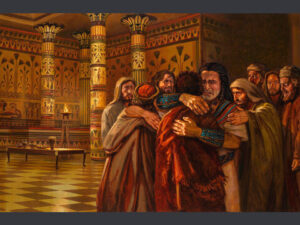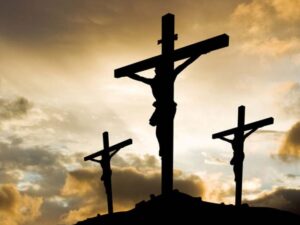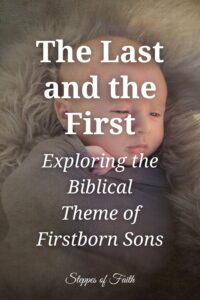
“So the last will be first, and the first last.” (Matthew 20:16)
In many cultures, especially in the ancient world, a firstborn child receives the largest portion of the father’s inheritance, called a birthright. Most often, the oldest son receives it, but the father could also give it to the oldest daughter if he had no sons (Num 27:11). The father intended the money to help the child continue caring for the family by supplying their needs.
The Bible contains many stories of firstborn children abusing their “blessing.” So God repeatedly chooses a younger sibling, illustrating that the birthright did not necessarily or automatically belong to the oldest or most important child. Naturally, God’s selection often angered the oldest sibling; however, the younger sibling usually abused the birthright, too.
Starting in the Bible’s opening pages and continuing through the New Testament gospels, a “firstborn-secondborn” theme emerges, illustrating an enormous truth about who inherits God’s eternal blessing.
The First Firstborn Occurrence
The first instance of the “firstborn-secondborn” theme is quickly found in Genesis 4, in the story of Cain and Abel. They were Adam and Eve’s oldest son.
Abel grew up as a shepherd, and Cain liked working in the fields. One day, they decided to bring a freewill offering to God. Cain brought “some of the land’s produce,” while Abel brought “some of the firstborn of his flock (vs3-4).” God accepted Abel’s offering but rejected Cain’s, making Cain “furious.”
Despite God’s encouragement to conquer his sin and “do what is right (v7)”, Cain still led Abel back to the field and killed him. He did not kill his younger brother because of his offering but because God chose the secondborn son over the firstborn son, who, culturally, is supposed to receive the greater blessing from his father. Cain could not handle God passing over, so he took his anger out on his brother. Nevertheless, after God spoke to him, he repented, and God blessed him (v13-15).
Generational Rivalry
Jacob and Esau had a similarly famous sibling rivalry (Gen 27) that continued through multiple generations.
Jacob, the secondborn son, tricked Esau into selling his birthright (Gen 25:29-34), then tricked their father, Isaac, into giving Jacob his blessing to get the inheritance.
To avoid Esau’s wrath, their mother, Rebekah, sent Jacob to her brother Laban’s farm, where Jacob met and fell in love with Rachel. Unfortunately, Uncle Laban only allowed Jacob to marry his firstborn daughter, Leah, thus setting up another sibling rivalry, this time between the sisters (Gen 29:16-30).
Even after Uncle Laban finally allowed Jacob to marry Rachel many years later, the rivalry between Rachel and Leah became so embroiled that they battled to see who could bear the most children, even employing their female slaves to sleep with Jacob (Gen 30:1-24).
Jacob later repented and reconciled with Esau as did Rachel and Leah. Further, Jacob, along with his father, Isaac, and grandfather, Abraham, became one of the founding fathers of the Jewish faith.
It took many years, but Rachel and Jacob eventually bore a son named Joseph (Gen 30:24), who also experienced God’s favor and sibling anger.
Because he loved Rachel more than Leah, Jacob favored Joseph more than his other sons, who were older than Joseph. God then gave Joseph a dream in which he wore a colorful robe, and his brothers bowed before him. The dream, plus their father’s blatant favoritism, angered the brothers so much that they threw him in a pit to die but then sold him into slavery to Egyptian traders (Gen 37).
Joseph prospered because of his unwavering faith and eventually became Egypt’s administrator. His older brother Judah, who opposed the plan to kill Joseph (Gen 37:26), joined Jesus’ bloodline (Mt 1:2).

The Firstborn Isn’t Always King
Another significant “firstborn-second born” theme in the Bible includes David, whom the prophet Samuel chose to succeed Saul as king (1 Sam 16:1-13). The older brothers, tall and handsome, seemed to be suitable to be king of Israel, but God rejected them all, telling Samuel,
“Do not look at his appearance or at his physical stature because I have refused him. For the LORD does not see as a man sees; for man looks at the outward appearance, but the LORD looks at the heart.” (1 Sam 16:7)
Jesse’s firstborn son and David’s brother, Eliab, later rebuked David when he asked questions about the Philistine Goliath.
“Why did you come down here? Who did you leave those few sheep with in the wilderness? I know your arrogance and your evil heart—you came down to see the battle!” (1 Sam 17:28)
David defeated Goliath and went on to be Israel’s greatest king, though he endured more generational rivalry with his son Absalom (2 Sam 13-15).
The “firstborn-secondborn” theme is not contained in the Old Testament. After Jesus’ arrival, He continued to challenge the tradition of firstborn children.
The Firstborn and the Prodigal Son
Jesus continually had issues with the Pharisees, who had become legalistic, self-righteous, discriminatory, oppressive, and uncompassionate, especially toward those seeking repentance. Their cold and ungodly behavior compelled Jesus to tell His most famous parable—the prodigal son.
Luke 15:11-32 recalls Jesus’ response to the Pharisees when they angrily approached Him, saying, “This Man receives sinners and eats with them.” Their accusation causes Jesus to launch into three parables—the lost sheep, the lost coin, and the prodigal (or lost) son. Each story is an illustration of God’s joy and the celebration that occurs when someone repents.
In the parable of the prodigal son, Jesus carefully describes His three characters—the father, the firstborn son, and the younger son. For those not familiar, here is a quick summary.
The younger son approaches his father and demands his portion of the inheritance, which would have been about one-third of the father’s entire fortune. The son journeyed somewhere far away, spent all the money on “wild living (v15, NASB),” and quickly descended into poverty. He found work feeding pigs and slowly figured out that he was better off with his father. So, he decided to go home and beg for his father’s forgiveness. To his surprise, his father showed him mercy instead of punishing him and threw a huge celebration.
But the firstborn son was not happy for his brother. He became outraged and complained to his father that he never received such special treatment. But the father lovingly responded,
“Son, you are always with me, and all that I have is yours. It was right that we should make merry and be glad, for your brother was dead and is alive again, and was lost and is found.” (v31-32, NKJ)
The First Will Be Last
Like previous Old Testament siblings, the Lord again chooses the younger brother in His parable to make His point: An ungrateful firstborn child who did not appreciate his father and abused his blessing, while the younger son received favor because he repented.
And this is where Jesus’ parable translates into an even larger illustration of Jews and Gentiles that few realize or consider.
Remember that Jesus directed His parable about the prodigal son at the Pharisees. As representatives of God’s children, they were symbolic of Israel, the firstborn son, but they repeatedly rebelled against Him and suffered greatly for it. It is why Jesus taught that whoever wants to be first must become last first, as told in the “Parable of the Laborers” in Matthew 20:16.
“So the last will be first, and the first last.”
Jesus repeats His message later in the same chapter when John, James, and their mother go to Him and ask if the sons can sit next to His throne in heaven. The other ten disciples hear the conversation and become very upset in another type of sibling rivalry. But Jesus quickly sets the matter straight.
“You know that the rulers of the Gentiles lord it over them, and those who are great exercise authority over them. Yet it shall not be so among you. But whoever desires to become great among you, let him be your servant. And whoever desires to be first among you, let him be your slave just as the Son of Man did not come to be served but to serve and to give His life a ransom for many.” (Matt 20:25-28)
Those who want to be first in God’s kingdom must humble themselves and be willing to serve others, thus supporting Jesus’ greatest commandment to love God first then others (Matt 22:37-40).
But Israel did not humble itself and serve others, especially God. They continued to be rebellious firstborn children. Their rebellion set up a sibling rivalry with Gentiles, the younger sibling in the prodigal son parable.

The Firstborn of Creation
As the second of the triune godhead, the Son of God, Jesus holds all power and authority and is responsible for all creation. Therefore, Paul declares Him “the firstborn of all creation (Col 1:15).” He is the ultimate firstborn son who deserves the Father’s ultimate blessing because He humbled Himself “to the point of death, even death of the cross (Phil 2:8).”
As a humble servant, Jesus is the first who became the greatest last. Yet, His holy righteousness compelled Him to confront the Pharisees (i.e., Israel), whom God called to receive His birthright blessing. And like the older sons in the Old Testament, they became angry enough to hang Him on a cross.
Israel sinned and rebelled against the Father, and they rejected their Messiah, the “firstborn of all creation.” So the Father offered His blessing to His secondborn children—those who put their trust in His Son Jesus. They are His brothers and sisters in a newly defined family.
“The Spirit Himself bears witness with our spirit that we are children of God, and if children, then heirs—heirs of God and joint heirs with Christ.” (Rom 8:16-17)
Like the prodigal son, believers in Christ may have gone their own way, but they eventually realize how much better it is to be with the Father. They feel the heaviness of their sin and repent then run home to Him, where all of heaven rejoices. They run home willing to put all rivalries aside and commit to serving the family. They, too, are willing to be last.
Israel is Not Forgotten
It is essential to understand that the Father never forgets his older child, Israel. Even in its rebellion, He undeniably loves his firstborn. Remember the father of the prodigal son. He told his older son,
“Son, you are always with me, and I that I have is yours.” (Luke 15:31)
God has not taken anything away from Israel. Everything He has is still there, waiting for them. All they need to do is repent through the Messiah Jesus and come home, which they will do in the last days. At that time, they will receive their full inheritance and share it with other believers in Christ (Rev 14:1-5), who graft them into the faith (Rom 11:16-24).
The “firstborn-secondborn” theme continues, but one day, Israel will open its eyes to the truth of the gospel and join their younger sibling in receiving God’s eternal blessing of eternal life.
Undoubtedly, all of heaven will celebrate, and together, we will finally be the family God always intended.

Yoh the presentations are very powerful and insightful. Lots of people could benefit from it.
I wish one could have access to download of these presentation for personal growth
I am happy to send you a copy.